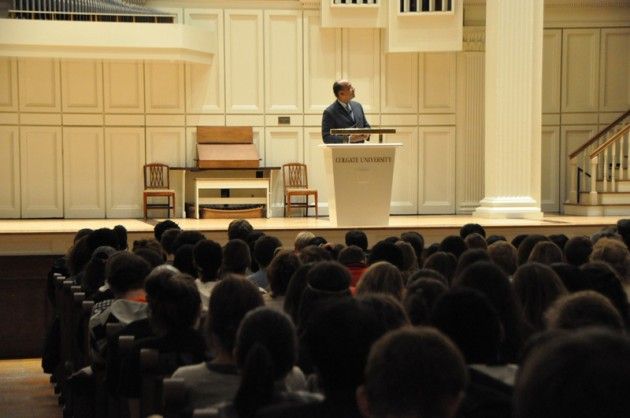Author of First-Year Summer Reading Book Speaks in the Chapel
On Monday, October 4, Laurance S. Rockefeller University Professor of Philosophy and the University Center for Human Values at Princeton University and author of the Class of 2014 summer reading book, Cosmopolitanism, Professor Kwame Anthony Appiah, gave a lecture before a packed audience in the Colgate Memorial Chapel. The audience consisted of members of the student body, faculty and administration.
Appiah was brought to campus through the collaboration of a number of different departments, including: First-Year Experience, First-Year Seminars, Core 152, African and Latin American Studies (ALST), the Africana, Latin American, Asian American and Native American (ALANA) Cultural Center, Department of Philosophy, Division of University Studies, Office of the Dean of Diversity and Office of the Dean of the Faculty.
Opening addresses to the lecture were given by Professor of Philosophy David McCabe, Director of Core 152 and President Jeffrey Herbst, who had been inaugurated just the day before.
Appiah lectured on the concept of cosmopolitanism, which is also the subject of his book. He focused on the ideas of global citizenship and responsibility, and how that plays into the way people live their lives. He advocated a global awareness and concern for the conditions of people around the world.
Appiah’s speech garnered a wide range of responses.
First-year Jackson Leeds said that while he enjoyed the lecture, he believed his goals to be impractical.
“Appiah is clearly an excellent public speaker and it was a pleasure to see him talk,” Leeds said. “However the conflict between idealism and realism exists in his argument. Regardless of how far we have progressed due to advances in technology, we are still quite far away from being able to genuinely engage in the cosmopolitan lifestyle he suggests. Appiah’s individual arguments are extremely powerful and we can all learn in some way from his open mindset, but in the end, cultural and political divides exist in the world that cannot be done away with simply by having a cosmopolitan mindset.”
This sentiment was shared by first-year Ryan Geisser, who expressed concern for the application of the idea of cosmopolitanism in the real world.
“It is a very rare experience to read a novel expressing a difficult theory to comprehend, and then to have the opportunity to hear the author explain it shortly thereafter,” Geisser said. “Though I truly enjoyed hearing the lecture, I must admit that as a result of the final student’s statement during the question-and-answer period, I have my doubts as to whether or not what he argues is, in fact, practical in today’s society,” Geisser said, refering to a question by a student after the lecture, regarding whether cosmopolitanism was inherently elitist, and only open to those of means.
While on campus, Appiah had breakfast with students from ALST and the African Students Union, participated in a video interview with President Herbst and met with faculty who teach Core 152: Challenges of Modernity, for which Cosmopolitanism is now a part of the curriculum.
Cosmopolitianism was chosen as the first-year summer reading book through a nomination process held by the First-Year Experience Advisory Board led by Dean of First-Year Students Beverly Low. The final decision made by the Dean of the Faculty.
“Cosmopolitanism was recommended because it speaks to shared human obligations in ways that attend to difference. It also exposes the challenges and tensions inherent in boundary-crossing conversations,” Chair of First-Year Seminar, Global Engagements and Core Distinction Programs Ken Valente said. “It also reminds students that, in joining an intellectual community, they’re expected to think deeply about the obligations we have to others.”







